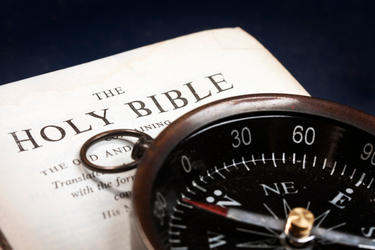Mayhem, Murder or a Moral Compass?

Source: Photos.com
Amidst the agitated handwringing and mounting despair, one voice touched on the truth. A popular local business columnist rightly wrote: "our community will not make progress until we help several generations rediscover their moral compasses."
This refreshing comment appeared even as alcohol-fueled shootings and stabbings amplified. With drinks pouring and blood flowing across the city, the Indianapolis police chief has even appeared on local live radio, pleading with disgruntled residents to adopt 12-step spiritually based programs to change their lives. Bereft of internal constraint, people follow their own path, however destructive. Unhappily, since that radio appearance, even more people have been stabbed, gunned down, and died.
So what is this moral compass and how could it help? What could energize a moral compass to point true north and lead people away from blood-stained conflict?
This business of 21st century morality is tricky. Some 175 years ago, Alexis de Tocqueville, author of the influential two-volume magnum opus Democracy in America , penned a number of insightful observations which ring down to today. Concerning morals, that now apparent distasteful word to many living in a digital world, he said: "The best laws cannot make a constitution work in spite of morals; [but] morals can turn the worst laws to advantage…Laws are always unstable unless they are founded on the manners [the internally driven civil conduct that constrains destructive mayhem and murderous behavior] of a nation; and manners are the only durable and resisting power in a nation."
In a 21st century state that all but worships the rule of law, what does this mean? In Indianapolis, it's not working . More laws and more policies – even helmeted policemen wearing full body armor – won't solve the problem.
But if one embraces and agrees to follow a "moral compass," what makes it truly effective, more than a pleasant-sounding, politically safe metaphor?
Morals have to be agreed upon as definitive. They have to possess power. Defining moral behavior according to some kind of slippery code of relativistic ethics will only make matters worse. There has to be an absolute, authoritative source of moral code.
Once upon a time, American moral code was based firmly on absolutes. And those absolutes were anchored in the living Word of God, the Bible. U.S. Presidents regularly declared national days of fasting and prayer, urging citizens to entreat the Almighty God as they understood Him to guide and direct national affairs. Even in the late 20th century, U.S. President Ronald Reagan selected a special inauguration theme (both terms) based on 2 Chronicles:7:14If my people, which are called by my name, shall humble themselves, and pray, and seek my face, and turn from their wicked ways; then will I hear from heaven, and will forgive their sin, and will heal their land.: "If My people who are called by My name will humble themselves, and pray and seek My face, and turn from their wicked ways, then I will hear from heaven, and will forgive their sin and heal their land."
But a century ago, along came moral relativism and in its treacherous wake, the substitution of oily platitudes of powerless human definitions of quasi-good and quasi-evil. This wretched and destructive philosophy makes its way even into popular consumer television, where we even see influential actors lamenting at the mere notion of moral absolutes. Want proof? Consider the popular Star Trek – the Next Generation series, where in one finale, the fictional captain of the Enterprise powerfully declares: "I realize now that there can be no justice so long as laws are absolute. Life itself is an exercise in exceptions."
So where does relative rubbish like that lead? It leads to deadly bullets fired in drunken or drug-fueled arguments. It leads to spirit-sapping corruption in governmental affairs. It leads to innocent babies being criminally neglected or abused. It leads to severe pain and hurt, even to the destruction of a nation! And it's all a result of people wrongfully and tragically taking moral matters into their own hands.
A compass powered by human-defined moral relativism points nowhere, but leads to death!
Make no mistake. The laws of God, expressed in the eloquent core bedrock of the Ten Commandments, are indeed absolute. They are not dependent on the recognition or agreement of human beings.
And when they are broken, they generate fearsome consequences. These consequences tear apart families. They rip proud societies into pieces.
None of this is preferred by God. Here's what the Almighty God says to us all: "Cast away from you all the transgressions which you have committed, and get yourselves a new heart and a new spirit. For why should you die …I have no pleasure in the death of one who dies,' says the Lord God. ' Therefore turn and live! '" (Ezekiel:18:31-32 [31] Cast away from you all your transgressions, whereby ye have transgressed; and make you a new heart and a new spirit: for why will ye die, O house of Israel?
[32] For I have no pleasure in the death of him that dieth, saith the Lord GOD: wherefore turn yourselves, and live ye., emphasis added).
Is there hope? In Democracy in America , de Tocqueville also wrote: "The greatness of America lies not in being more enlightened than any other nation, but rather in her ability to repair her faults."
Will we attempt to repair our faults? Accepting and yielding to the biblical absolutes of the living Word of God, will we energize our internal moral compass with a new heart and a new spirit created and sustained by a loving, merciful and almighty God?
The turning of a nation to God begins with one person. Mayhem, murder or a spiritually powered moral compass. What's your choice?



No comments:
Post a Comment